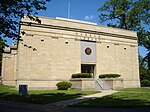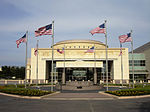Presidential Library
A presidential library in the United States is a building that documents the tenure of a former president . Today's libraries form a nationwide network administered by the Office of Presidential Libraries. This, in turn, is part of the administration of the National Archives and Records Administration (NARA).
The tradition was started by Herbert Hoover, whose tenure ended in 1933. These are not traditional libraries , but archives that hold papers, records and other historical materials of the respective president. They are also open to the public.
overview
Every President of the United States has a presidential library, usually in his or her state of birth or at least in his sphere of influence, that holds documents, artifacts, and illustrative materials related to his or her previous presidential career. Each library also contains a museum and runs public programs. When a president leaves office, NARA sets up a new presidential project until a new presidential library has been built and transferred to the federal government.
The presidential library system currently consists of 13 libraries. There are also libraries for some presidents before Hoover, which are not under the administration of the National Archives and Records Administration , and also the Jefferson Davis Presidential Library , which does not belong to the system of presidential libraries because Jefferson Davis was President of the Confederate States of America .
history
Before the presidential library system existed, the presidents or their heirs distributed the documents after the end of their government. Although many collections prior to Hoover are now in the Library of Congress , others are spread across many libraries, historical societies, and private collections. Many materials were lost or destroyed.
The presidential library system officially began in 1939 when President Franklin D. Roosevelt donated his personal and presidential documents to the federal government. At the same time, Roosevelt bequeathed part of his real estate in Hyde Park, New York to the United States, and friends of the President founded a non-profit organization to raise funds for the construction of a library and museum. Roosevelt's decision was based on the belief that the President's documents were an important part of American national heritage and should be made available to the public. He asked the national archives to keep the documents and other historical materials and to manage his library.
In 1950 Harry S. Truman decided that he would also build a library to house the President's documents and sought legislative process in Congress. In 1955, Congress passed the Presidential Libraries Act , which created a system of privately owned and state-run libraries. The resolution encouraged other presidents to donate their historical materials to the government and ensured that these documents were preserved and made available to the public. After this and other acts of the congress, further libraries were established. In each individual case, private and non-federal public sources provided the funds for building the library. Upon completion, the private organizations handed the libraries over to the National Archives and Records Administration (NARA) for operation and maintenance.
Until 1978, presidents, scholars, and lawyers believed , since George Washington's time , that the records made by the president or his staff during his tenure were the personal property of the president and could be taken away by him when he left office . The first presidential libraries were founded with this legal conception. NARA successfully convinced the presidents to donate their historical materials to the federal government in order to keep them in a library managed by NARA.
The Presidential Records Act of 1978 provided that President's records, which document the constitutional, legal, and ceremonial duties of the President, were owned by the United States government. After a president leaves office, the United States archivist takes hold of the documents. The law allows the presidential libraries to retain these documents.
The Presidential Records Act of 1986, which required private foundations equal to the size of the library, changed the presidential libraries significantly. NARA uses these foundations to finance part of the maintenance costs of a library.
Stocks
The presidential libraries hold over 400 million pages of text documents, nearly 10 million photographs, more than 5,000 km of film, nearly 100,000 hours of audio and video recordings, and approximately half a million museum objects. These diverse collections make any library a valuable source of information and a center for research on a presidency.
The most important texts in any library are those created by the President and his staff in the performance of his official duties. The libraries also contain many museum items, including family heirlooms, items collected by the president or his family, campaign souvenirs, prizes, and the many gifts given to the president by American citizens or foreign dignitaries. These gifts range from handicrafts to precious works of art. Curators in the presidential libraries and other museums use these collections for historical exhibitions.
Other important holdings are the personal papers and historical materials donated by individuals associated with the President. These individuals include cabinet members, envoys to foreign governments, party friends, the president's family, and personal friends. Various libraries have set up oral history programs that have provided tape memoirs. A third volume of inventory is the documents that a president has accumulated before or after his presidency. Such collections include documents pertaining to Roosevelt's time as governor of New York and Dwight D. Eisenhower's long military career.
Every president since Hoover was or is buried at his own will in his presidential library. Exceptions are John F. Kennedy and Lyndon B. Johnson . Kennedy is buried in Arlington National Cemetery , Johnson on his ranch in his family-run hill country in Texas.
Overview
Outside the United States
The Federal Republic of Germany has adopted the system of presidential libraries in the beginning by setting up six direct federal foundations under public law, the so-called political memorial foundations, for outstanding German statesmen . These are the Otto von Bismarck Foundation in Friedrichsruh , the Reich President Friedrich Ebert Memorial Foundation in Heidelberg , the Federal Chancellor Adenauer House Foundation in Rhöndorf , the Ludwig Erhard House Foundation in Fürth , and the Federal President Theodor Foundation Heuss House in Stuttgart , the Federal Chancellor Willy Brandt Foundation in Berlin and the Federal Chancellor Helmut Schmidt Foundation in Hamburg .
Web links
Individual evidence
- ^ Visit Presidential Libraries and Museums. archives.gov
- ^ David S. Ferriero: Creating the Obama Library. In: Prologue Magazine. Volume 47, No. 3, 2015


















